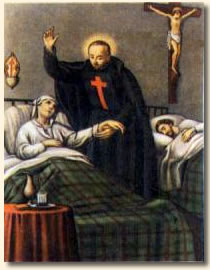
Extreme Unction

Saint Camillus de Lellis,
patron saint of the sick
The Sacrament "Extreme Unction," is the anointing given to those who are gravely bodily ill, especially those in danger of death from bodily illness or from violence already done to the body (i.e., a soldier about to go into battle is not a candidate for the Sacrament; one who has been shot and lies gravely wounded or, especially, dying, is).
|
|||
The effects of
the Sacrament are the strengthening and comfort of the soul of the anointed one,
the remission of sins and some of their temporal punishments, and the possible
restoration of bodily health.
The Rite in which the Sacrament is offered includes the Sacraments of Penance
and the Eucharist (in that order), followed by the Sacrament of Unction itself.
It may be received conditionally up to three or four hours after apparent death
(we can't presume to know the moment the soul leaves the body and can only know
with moral certainty that death has occurred after corruption has begun). If the
sick one is unconscious, conditional absolution and Unction are offered, without
the Eucharist (known at this time as "Viaticum," meaning "Food for the
Journey").
The matter of the Sacrament is the Oil of the Sick ("Oleum Infirmorum"), which
is olive oil blessed by the Bishop on Maundy Thursday (the Thursday of Holy Week
-- the week before Easter).
The form of the Sacrament are the words:
Through this Holy Unction or oil, and through the great goodness of His mercy, may God pardon thee whatever sins thou hast committed by evil use of sight (sight, hearing, smell, taste and speech, touch, ability to walk).
Latin:
Per istam sanctan unctionem et suam piissimam misericordiam, indulgeat tibi Dominus quidquid per (visum, audtiotum, odorátum, gustum et locutiónem, tactum, gressum deliquisti.)
If death is so imminent that there is no time for the full Rite, the Sacrament may be given with a single annointing on the forehead and the words:
Through this holy unction may the Lord pardon thee whatever sins or faults thou hast committed.